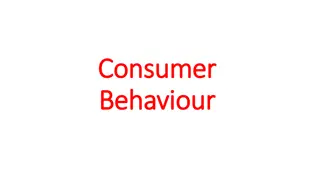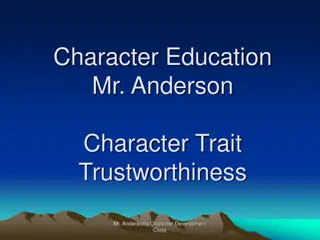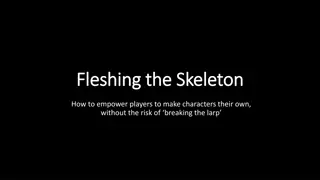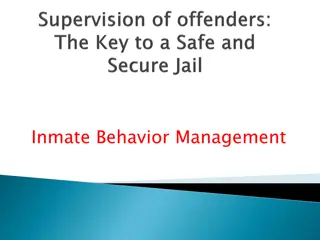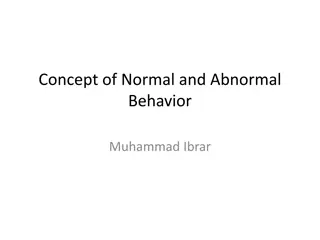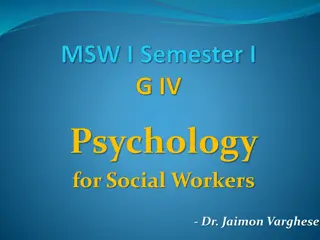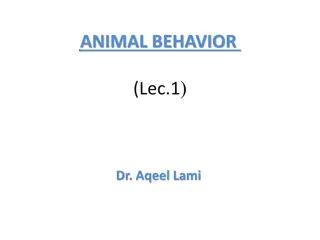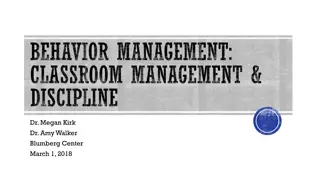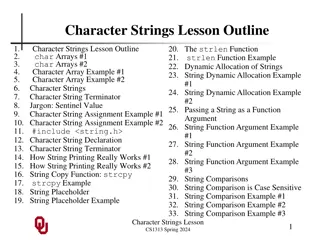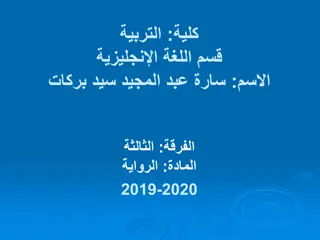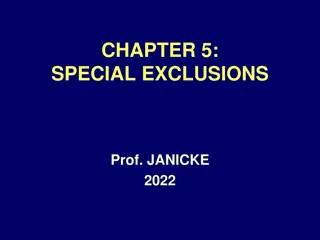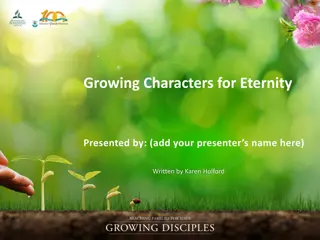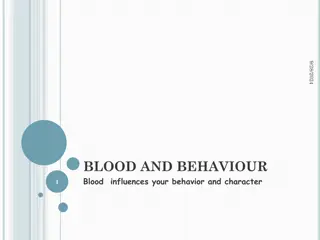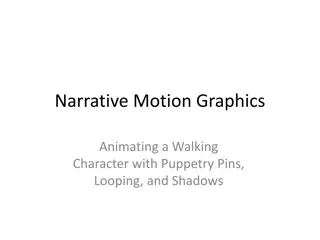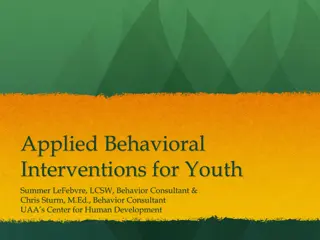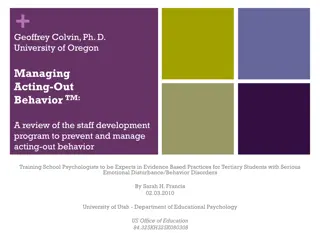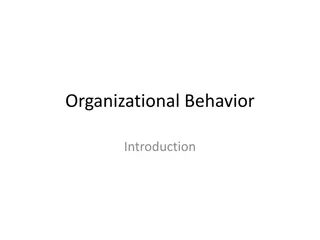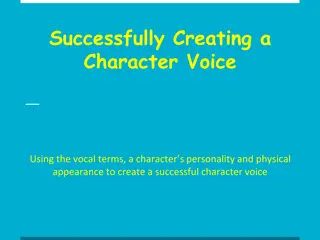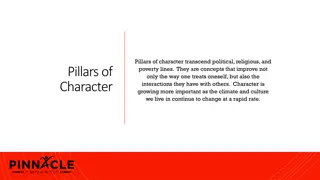Function Based Thinking
Function-based thinking in Missouri Schoolwide Positive Behavior Support, emphasizing data-based decision-making, mission clarity, and effective teaching practices. Understand how behavior is related to the environment and how environmental interventions play a key role in shaping expected behaviors
8 views • 27 slides
Addressing Predatory Behavior in the Fellowship
Predatory behavior, especially towards vulnerable members, is a concerning issue in the fellowship. This behavior includes unwelcome advances, exploitation of power dynamics, and institutional sexism. The discussion on predatory behavior necessitates honest dialogue and a united approach for a safer
3 views • 13 slides
Mastering Character Descriptions: Show, Don't Tell Techniques
Enhance your character descriptions by utilizing language devices such as similes, metaphors, alliteration, verbs, adjectives, and adverbs. Learn how to show rather than tell by using vivid descriptions and unique synonyms. Understand how readers infer character traits through details like name, age
0 views • 11 slides
Consumer Behavior in Marketing
The design of a marketing program starts with understanding consumer behavior. Consumers, as the end users, play a crucial role in shaping market trends. Producers seek insights into consumer personas, market behaviors, and influencing factors. Management focuses on the consequences of consumer beha
3 views • 26 slides
Mr. Anderson's Character Development Class
Explore the key character traits of trustworthiness, loyalty, and integrity in Mr. Anderson's Character Development Class. Understand the definitions, examples, and associated words of these qualities to cultivate a strong moral foundation. Dive into the importance of honesty, reliability, responsib
0 views • 25 slides
Psychology: The Science of Behavior and Mental Processes
Psychology is the scientific study of behavior and mental processes. Psychologists study both observable behavior and private mental processes. The primary goals of psychology are to describe, understand, predict, and control behavior. Different branches of psychology, such as applied psychology, cl
2 views • 29 slides
Evolution of Directions on Good Character in Legal Proceedings
The significance of providing good character directions in legal proceedings has evolved over time, progressing from being discretionary to mandatory in certain situations. This presentation delves into the historical development of allowing evidence of good character, the definition of character in
2 views • 33 slides
Empowering Player Character Creation in LARP
Discover how to empower players in Live Action Role-Playing (LARP) games to create unique characters while maintaining balance and coherence within the game world. Learn about the roles of larpwrights and players in character creation, providing structure for character development while allowing spa
2 views • 9 slides
Inmate Behavior Management in Correctional Settings
Inmate Behavior Management in correctional facilities involves supervising inmates, implementing corrective discipline, and fostering a fair and consistent environment. It emphasizes the importance of behavior management plans, identifying undesirable traits in supervision, and passing educational a
1 views • 19 slides
Human Behavior: Foundations and Factors
Human behavior is a multifaceted subject influenced by genetic makeup, culture, and individual values. It encompasses both overt actions and covert thoughts, a product of the individual and environmental factors. Psychologists study behavior from visible (overt) actions like playing football to inne
0 views • 20 slides
Developing Good Leadership through Character, Competence, Compassion, and Charisma
Leadership is a deliberate journey that requires developing qualities such as character, competence, compassion, and charisma. Effective leadership entails guiding oneself and others towards positive outcomes. Character is foundational, expressed through behavior and personal choices. Leadership ski
0 views • 54 slides
Normal and Abnormal Behavior: Perspectives and Definitions
Normal behavior varies from person to person and society, influenced by individual preferences and societal norms. Abnormal behavior is characterized by an inability to function effectively or personal discomfort. The concept of normality and abnormality in psychology raises complex questions about
3 views • 8 slides
Character Visualization Techniques in Literature
Rudyard Kipling, in "The Jungle Book," masterfully describes Bagheera, the Black Panther, using vivid imagery to help readers visualize him. The author paints Bagheera as inky black with panther markings that shimmer like watered silk in certain lights. Known for his cunning nature, Bagheera's soft
3 views • 10 slides
Building a Community of Character through Curriculum and Counseling at ECAP
The ECAP Counseling Plan emphasizes choosing positive actions and character for living, with a mission to encourage individuals to think of consequences before acting. The belief that one can control responsive actions to make positive decisions guides the goal of building a community of character.
0 views • 15 slides
Human Behavior: Insights for Social Workers
This material delves into the intricacies of human behavior, exploring factors influencing behavior such as heredity, environment, intelligence, needs, and motives. It covers the concept of human behavior, stages in life from conception to old age, and theories of human development by eminent psycho
2 views • 71 slides
Animal Behavior and Ecology
Animal behavior encompasses a range of activities such as feeding, breeding, and social interactions. Ethology focuses on studying behavior in natural environments, while behavioral ecology examines ecological aspects like predator-prey interactions. Sociobiology delves into the evolution of social
3 views • 5 slides
Foils in Literature and Media
A foil is a character in a story that contrasts with another character, often the protagonist, to highlight their qualities. It can be completely opposite or similar with a key difference. Foils are used to emphasize specific traits of the main character without being the antagonist. Examples of foi
0 views • 10 slides
Behavior Management in Classroom Settings
Explore the essential topics of behavior management, classroom strategies, and discipline in educational settings. Delve into the functions of behavior, impact of trauma on learning, and effective management techniques. Learn how to identify underlying reasons for student behaviors, discuss behavior
0 views • 76 slides
Character Strings in C Programming
Dive into the world of character strings in C programming with topics like string declaration, termination, copying functions, comparisons, and dynamic allocation. Explore how to work with character arrays and pass strings as function arguments for effective programming. Enhance your knowledge throu
0 views • 33 slides
Plot Structure and Conflict in Storytelling
Plot structure is a key element in storytelling that outlines the sequence of events in a narrative. It consists of the exposition, rising action, climax, falling action, and resolution. Additionally, conflicts drive the plot by creating tension and obstacles for the characters to overcome, such as
0 views • 13 slides
Targeting Emotions to Facilitate Behavior Change in Older Adults
Efforts in changing health behavior have traditionally focused on social and cognitive factors, but recent evidence highlights the importance of affective states in decision-making and behavior change. Janey Peterson discusses the role of emotions in achieving and sustaining behavior change to benef
0 views • 11 slides
Grading Criteria for Effort and Behavior in Educational Reporting
Effort and behavior in educational settings are evaluated based on criteria ranging from Excellent to Causing Concern. Pupils demonstrating excellent behavior show respect, responsibility, and positive engagement in learning. Those with good behavior exhibit cooperation and respect for others, albei
0 views • 9 slides
Analysis of Narrative Techniques and Character Development in Pride and Prejudice
Jane Austen's novel, Pride and Prejudice, employs a third-person omniscient narrator to provide insights into character perspectives, particularly focusing on Elizabeth Bennet. The narrative techniques reveal different viewpoints and character depths, while the character analysis of Mr. Bennet showc
0 views • 10 slides
The Factors Influencing Character Development
Exploring the concept of character development, this content delves into the Greek origin of "Charasso," meaning a distinguishing mark or quality. It discusses the factors shaping our character, from natural influences like heredity and upbringing to spiritual factors like Christ, the Fruits of the
0 views • 27 slides
Special Exclusions in Character Evidence Law
Explore the nuances of character evidence in legal contexts through Professor Janicke's insights on special exclusions, including the limitations and exceptions in civil and criminal cases, the reasons character evidence is often disallowed, and the application of Rule 404(b) for specific circumstan
0 views • 48 slides
Strengthening Character Traits for Eternal Growth
Explore the concept of character strengths through a spiritual lens, focusing on qualities like love, joy, and perseverance. Reflect on God's character to identify strengths to develop in becoming more like Him. Develop character traits with guidance from 2 Peter 1:5-8 and nurture your own strengths
0 views • 13 slides
Automatic Discovery of Character Infoboxes from Books - CharBoxes System
The CharBoxes system aims to automatically discover character infoboxes from books, assisting in effective summarization, marketing, and understanding of book characters. By extracting important character details, constructing social graphs, summarizing character-centric text, and more, CharBoxes en
0 views • 20 slides
Blood Types and Personality Traits - Insights into Behavior and Character
Blood types O, A, and B are associated with specific personality traits and behaviors. Those with blood type O are characterized by confidence, honesty, and optimism. Blood type A individuals tend to be perfectionists, sensitive, and pessimistic. Blood type B individuals are creative, expressive, an
0 views • 10 slides
Character Development in Mango Street
Explore the character dynamics and transformations in Mango Street through the analysis of foils, character comparisons, and thematic connections with Greek mythology. Delve into Esperanza's growth and experiences as you prepare for an upcoming test on the book's key themes and character development
0 views • 13 slides
Animating a Walking Character with Puppetry Pins and Shadows
Delve into the art of character animation using puppetry pins and shadows in Narrative Motion Graphics. Learn the step-by-step process of creating a walking character, setting up pins for movement, animating key poses, and looping the animation seamlessly. Enhance your skills in character animation
0 views • 6 slides
Applied Behavior Analysis (ABA) for Youth Interventions
Applied Behavior Analysis (ABA) is a science focusing on improving human behavior by increasing desired behaviors, teaching new skills, and generalizing behaviors. ABA emphasizes observable behaviors, measurement of behavior change, and the use of interventions in various settings like classrooms an
0 views • 25 slides
PBIS Expectations and Behavior Flowchart
The PBIS flowchart outlines behavior expectations and interventions for minor and major incidents in a school setting. It covers disrespectful behavior, disruption, defiance, property damage, theft, possession of weapons, and more. The flowchart guides teachers and staff on managing and addressing s
0 views • 6 slides
Managing Acting-Out Behavior: A Staff Development Program Review
This review discusses a staff development program created by Geoffrey Colvin, Ph.D., from the University of Oregon, focusing on preventing and managing acting-out behavior in students with emotional disturbance or behavior disorders. The program includes video presentations, strategies for behavior
0 views • 22 slides
Organizational Behavior and Individual Behavior
Organizational Behavior (OB) is a multidisciplinary field that combines knowledge from various disciplines to study and manage organizations effectively. It emphasizes the application of this knowledge to enhance organizational effectiveness and the well-being of participants. OB is a useful concept
0 views • 38 slides
Function-Based Behavior Support Plans: A Comprehensive Guide
Explore the process of developing Function-Based Behavior Support Plans (BSP) using Functional Behavioral Assessment (FBA). Understand the concepts of function and functional behavior assessment, learn how FBA/BSP fits within a multi-tiered support system, and practice developing BSP for students. D
0 views • 74 slides
Mastering Character Voice Creation
Explore the art of creating a character voice by understanding vocal terms, personality traits, and physical appearance. Learn how pitch, quality, rate, emphasis, inflection, and articulation shape a character's voice. Dive into developing character personality, traits, and sharing insights for effe
0 views • 13 slides
Importance of Character Development and Pillars of Character
Character development is crucial in today's ever-changing world, transcending political, religious, and poverty lines. The pillars of character, such as empowerment, excellence, enthusiasm, balance, self-control, teamwork, and more, play a significant role in shaping individual interactions and beha
0 views • 19 slides
Uncovering Character Development in "Starseeker: Tim Bowler - Chapter Insights
Delve into the intricate character developments in the novel "Starseeker: Tim Bowler" through thought-provoking lessons, detailed character analysis, and engaging activities. Explore the depths of Luke, Speed, Skin, and Daz as you unravel their personas and journey through their evolving narratives,
0 views • 43 slides
Federal Character Principles in Tertiary Institutions: Implementation, Implications, Challenges
Dr. Shettima Bukar Abba Ag., Executive Chairman of the Federal Character Commission, presented a paper on the implementation, implications, and challenges of Federal Character principles in tertiary institutions at a retreat organized by the National Commission for Colleges of Education. The histori
0 views • 26 slides
Plans
Behavior intervention plans are essential tools that focus on modifying behaviors through applied behavior analysis techniques, addressing functions of behavior and consequences in various settings. Learn about behavior analysis principles, functions of behavior, and why behaviors occur to effective
2 views • 56 slides



